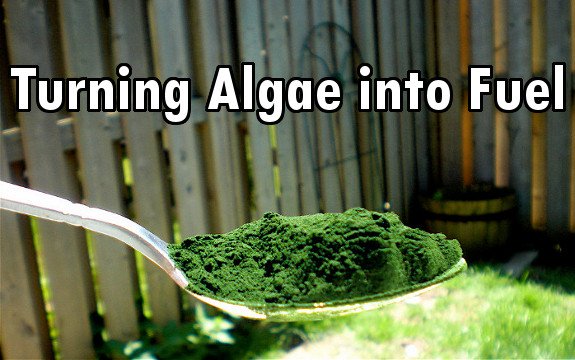Alt. Fuel: Scientists Turn Algae into Usable Fuel in Less than an Hour

 Algae has already been touted as a natural healing wonder. Not only does have its high chlorophyll content and special plant compounds been shown to defeat cancer and heart disease, it also shows promise as a replacement for butter and eggs in gluten free and vegan baked goods. Even giants like Unilever, which make unhealthy household items, have looked to algae as a replacement for palm oil in many of its products since palm oil production is destroying our bio-diverse rain forests. But perhaps the latest and most promising news about algae, though, is that it could replace petroleum fuels.
Algae has already been touted as a natural healing wonder. Not only does have its high chlorophyll content and special plant compounds been shown to defeat cancer and heart disease, it also shows promise as a replacement for butter and eggs in gluten free and vegan baked goods. Even giants like Unilever, which make unhealthy household items, have looked to algae as a replacement for palm oil in many of its products since palm oil production is destroying our bio-diverse rain forests. But perhaps the latest and most promising news about algae, though, is that it could replace petroleum fuels.
Aside from polluting the planet, petroleum-based products, used in cosmetics and a thousand other products including bicycle tires, fertilizer, paint, shag rugs, and ever shoes, are very detrimental. Cancer-causing chemicals like 1,4-dioxane and other poisonous compounds (up to 10,500 of them) are in everything from soap to bubble bath and toothpaste.
If your lips are chapped and you’ve used petroleum jelly, you’ve also exposed your body to carcinogenic compounds that may temporarily relieve your cracked lips, but can cause breast cancer, lymphoma, Parkinson’s, and a multitude of other diseases.
Alternatively, algae shows promise as a replacement for both petroleum and palm oil as a fuel source. Within algae lay dormant, vast stores of biofuel – estimates compare algae to oil and find that algae can produce from seven to 31 times the fuel than the next best crop that has been planted to power the planet – palm oil.
In fact, the U.S. Department of Energy pledged to invest up to $24 million in three research groups looking at ways to commercialize algae-based biofuels, and $16.5 million have already been invested in programs in Hawaii, New Mexico, and California.
The Smithsonian recently reported that scientists turned algae into usable fuel (crude oil) in less than an hour. Scaling up the use of algae would take land about the size of the state of Maryland. Conversely, palm oil is eating up our rainforests globally, eating up usable land.
“. . .palm oil is expected to be the world’s most produced and internationally traded edible oil. . .”
While deforestation is happening due to a number of causes, including commercial agriculture, subsistence farming, palm-oil plantations, and clear-cutting for paper and furniture, reducing the land we use for fuel would save our rainforests and also produce a healthy by-product which even oxygenates the air.
Though a Mercedes-Benz bio-diesel E320 was premiered a while back that might conceivably run on algae fuel, most cars haven’t been tested for emissions or gas-mileage. Also, algae has to be grown under very specific conditions, with controlled temperature, relatively high up-front capital expense, and the requirement of phosphorous to grow the plant – which is quickly becoming scarce. Oh, and of course genetic engineers looking at utilizing GMO algae that could through the planet into yet another ‘un’ natural catastrophe (not).
Still, weighing the pros and cons of algae-based bio-fuels, they look quite promising.
